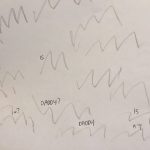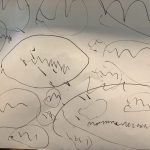Emergent Literacy is Play
- Pointing to scribbles and saying what they mean
- Different paint color per animal
- “MOM”
- “Words” in word bubbles
Before my daughter’s music class starts, the moms that attend get a chance to chat while we wait for the previous class to end. Last week, the conversation turned toward preschool and what we’ve all decided. One mom said that she wasn’t going to pay for three-year-old preschool because “all they do is play.”
I’ve thought about this notion all week and have decided that play is not such a bad thing.
When Literacy Begins
In a master’s thesis, Kelly Day says, “Emergent literacy is the natural occurring reading and writing behaviors of children beginning at birth, up until they learn to read and write conventionally.”
Some examples of emergent literacy at my house–which you can see in the image above–include my daughter’s:
- “doing work” and using a pencil to write jagged zig zags on paper and cards
- pointing to distinct scribbles she has written and saying one word for each scribble
- noticing word bubbles in the “Elephant and Piggie” books and asking who is talking
- taking a familiar book and turning the pages while “reading” it to her mom and dad
- looking at a red candy wrapper with white writing and knowing that it says “Kit-Kat”
- hanging up a “missing cat” poster and asking me to add numbers for the phone number
Writing Through Play
“Play is often talked about as if it were a relief from serious learning. But for children play is serious learning.” – Fred Rogers
Much of the writing my daughter creates is based in play. She is a doctor taking notes on her clipboard like Doc McStuffins. She is Mom doing work on the computer and typing words. She is a waitress taking your order in her special black notepad. She is a scientist studying bugs, and making observations in her notebook.
Lots of the games that she and my husband play deal with rhythm and rhyming words. In one game, he reads a familiar book that rhymes and leaves off the last word/rhyme, and she fills it in. Sometimes she thinks that rhyming is when words have the same beginning sounds. One of her favorite phrases right now is: “Hey, that rhymes!” Instead of correcting her, we usually run with it and try to think of more words that have that same sound.
Bring Back the Fun
When I see the joyful play that my daughter partakes in daily, I can’t help but think about how my classroom should awaken students’ playfulness in writing and reading. Where are the areas in my literacy instruction that suffer drabness? How might I capitalize on all I’ve learned about gaming and the Makerspace culture from the MACUL conference to evoke joyful play in my students? Here are some ideas:
- Poetry has always been a source of joy and so I think I will revisit poem-a-day annotations and perhaps incorporate some interesting technology to further the conversation.
- Try to use popular song lyrics, rap and rhythm, or rhyming poems more in mini-lessons.
- I recently attended the 4T Virtual Conference and learned about Genius Hour: giving students 20 percent of class time to work on a project of their own choosing and direction. I’m interested in making Genius Hour happen in my classroom.
- I want to have a game area (with games like Scrabble, Up Words, Boggle, Balderdash, Madlibs, Crosswords) that students can use at set times or when they are feeling unmotivated.
- I’m still thinking about how to create a Makerspace in my classroom–what it would have, when kids would use it, how would I infuse writing without making it drain the fun.
Mostly, I want to do more than just add an activity to my daily routine. I want to make play a real focus in my classroom, because a playful mind is a thoughtful mind.
In sending my daughter to preschool next fall, I’m most excited to see how she will negotiate all this playing, this conversation, this pre-literacy–with other kids her age. How they will all create a new, collective knowledge of the world around them and change or grow their sense of what it means to be–all because of play!
 Caroline Thompson (@TeacherThompson) taught middle school ELA for twelve years in Lake Orion before becoming a stay-at-home mom. She supports AARI teachers for Oakland Schools as an independent literacy consultant in the areas of digital media, professional development, and non-fiction resources. Caroline is a Reading and Writing Workshop advocate, a 2008 Oakland Writing Project Teacher Consultant, and a 2009 Oakland County Outstanding Teacher of the Year Nominee. She has a BA in English from Michigan State University and a Masters in the Art of Teaching Reading from Oakland University. She lives in Berkley, Michigan with her husband and their three year old daughter.
Caroline Thompson (@TeacherThompson) taught middle school ELA for twelve years in Lake Orion before becoming a stay-at-home mom. She supports AARI teachers for Oakland Schools as an independent literacy consultant in the areas of digital media, professional development, and non-fiction resources. Caroline is a Reading and Writing Workshop advocate, a 2008 Oakland Writing Project Teacher Consultant, and a 2009 Oakland County Outstanding Teacher of the Year Nominee. She has a BA in English from Michigan State University and a Masters in the Art of Teaching Reading from Oakland University. She lives in Berkley, Michigan with her husband and their three year old daughter.




